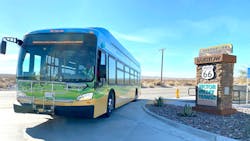VVTA brings new battery electric buses to Barstow
Victor Valley Transit Authority (VVTA) delivered five new battery electric buses (BEBs) to Barstow, Calif., this week.
This is the first time passengers in the city of Barstow and neighboring communities will get to ride these New Flyer Xcelsior XE battery electric buses. BEBs are another step towards VVTA’s commitment to operating strictly zero-emission vehicles by 2035.
In 2018, the VVTA Board adopted its approval of Resolution Number 18-04 “its commitment to operate a 100 percent all electric and hydrogen fuel cell fleet, and establish a goal to meet this objective by 2035.” The first seven BEBs have been in service throughout the Victor Valley since 2019, and now with VVTA’s new Barstow Facility, which was designed with the future implementation of BEBs in mind and successfully opened during the height of the pandemic, the time is right to bring BEBs to Barstow.
“The move into battery-electric technology is the right move at the right time for Barstow,” said VVTA Board Member and Barstow Council Member James Noble. “By procuring battery electric buses, VVTA places itself in a position to have Southern California Edison (SCE) provide all the required electric infrastructure as part of their SCE Charge Ready Transit Bus Program. This alone could save VVTA approximately $1 million in the cost of bringing power lines and enough electric power to VVTA’s Barstow facility.”
The California Air Resources Board (CARB) enacted its proposed Innovative Clean Transit (ICT) in 2018. In response, VVTA got out in front of the regulation, taking advantage of the available incentives before actual regulation deadlines. For instance, VVTA was able to take advantage of the VW Mitigation incentive for purchasing zero-emission buses. Volkswagen (VW) Environmental Mitigation Trust provides about $423 million for California to mitigate the excess nitrogen oxide emissions caused by VW’s use of illegal emissions testing defeat devices in certain VW diesel vehicles. VVTA applied for these funds to apply to the purchase. The agency was awarded $180,000 per each of the five BEBs ordered for Barstow.
“VVTA analysts have carefully considered its zero-emissions options, reviewing an enormous amount of research and performance data from several different agencies to address the critical climate and operational challenges in VVTA’s service area,” said VVTA Director of Fleet and Facilities Dustin Strandberg. “Factoring in all the unique variables, the steep hills, long distances, extreme weather, and traffic patterns, we are confident in the package we have selected and the limited number of routes these buses will successfully serve.”
With an average range of approximately 150 miles between charges, VVTA plans to deploy the five 40-foot buses in the coming days. Projected operational savings over the 12-year life of these vehicles is expected to be over $125,000 in maintenance savings over conventionally powered vehicles.
